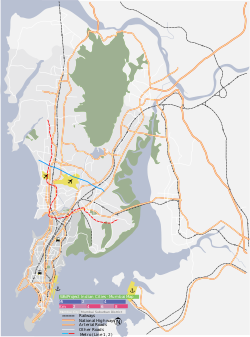Top Qs
Timeline
Chat
Perspective
Mazgaon
Neighbourhood in Mumbai, Maharashtra, India From Wikipedia, the free encyclopedia
Remove ads
Mazagaon, also spelled Mazgaon or Mazagon, and historically known as Mazagão during the Portuguese era,[1] is a historic neighbourhood in South Mumbai. It was one of the original Seven Islands of Bombay and is now fully integrated into the Mumbai Metropolitan Area. Locally, Christian Bombay East Indians refer to it as 'Mazgon' or 'Maz-a-gon'.
This article needs additional citations for verification. (February 2012) |
This section needs expansion. You can help by adding to it. (February 2024) |
Remove ads
Location
Mazagaon is located in South Mumbai and is bordered by Byculla to the west, Reay Road and Ghodapdeo to the northeast, and Dockyard Road to the east. It falls under the 'E' Ward of the Brihanmumbai Municipal Corporation (BMC).[2]
Landmarks and Heritage
Summarize
Perspective
Aga Khan's Maqbara
Also known as Hasanabad Dargah, this mausoleum is the resting place of Aga Khan I. Constructed between 1881 and 1884, its architecture is inspired by the Taj Mahal. The site is maintained by the local Khoja Muslim community and is often referred to as \"Mumbai’s Taj Mahal\".[3]
Gloria Church
Gloria Church was originally built in 1632 by Portuguese Franciscans at the foot of Mazagaon Hill. The current structure, located in Byculla, was rebuilt in 1913 in the English Gothic Revival style. The church has been featured in Indian films, including Amar Akbar Anthony (1977).[4]
Joseph Baptista Gardens
Also known as Mazagaon Gardens, this 1.5-acre hilltop park was developed over a covered water reservoir between 1880 and 1884. The garden offers panoramic views of the Mumbai harbour and was once the site of Mazgaon Fort. It is named after Indian freedom fighter Joseph Baptista and remains a popular local recreational spot.[5]
Matharpacady Village
Matharpacady is a heritage East Indian Catholic enclave within Mazagaon. It features well-preserved Portuguese-style homes and narrow lanes that reflect Mumbai’s colonial architectural legacy. Although its footprint has reduced over time, the area retains much of its original character and continues to be a focus for cultural preservation efforts.[6]
Remove ads
See also
References
Wikiwand - on
Seamless Wikipedia browsing. On steroids.
Remove ads
